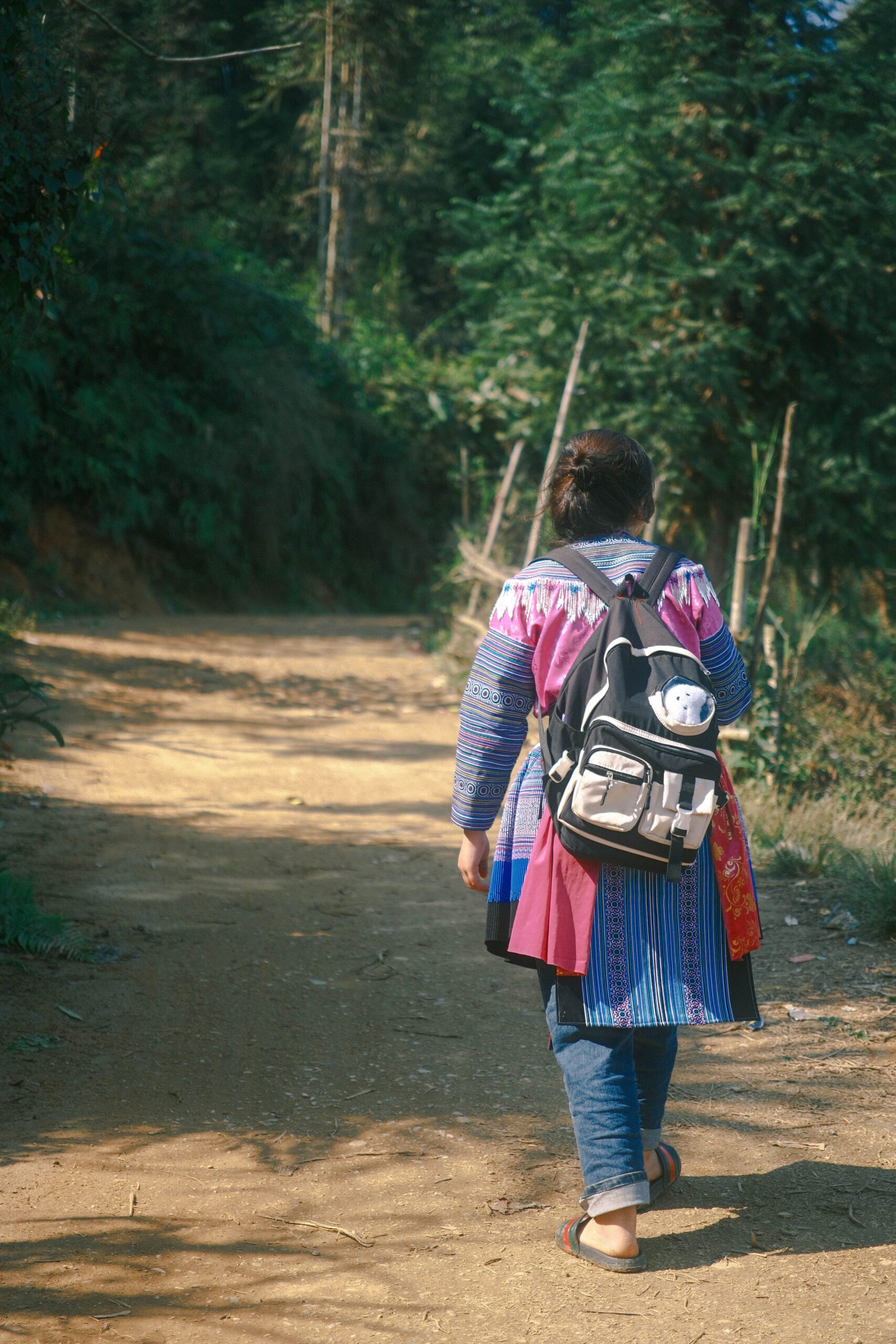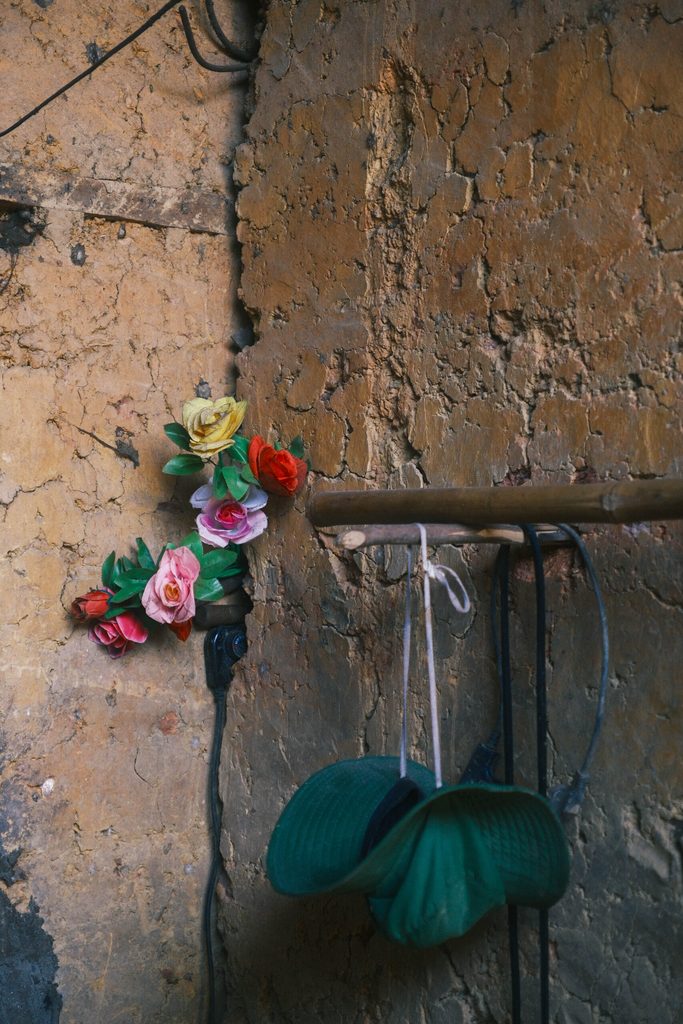The long journey home – Dan’s escape from early marriage
After being forced into early marriage when she was only 12, Dan decided to escape and return home and return to school. Despite the rough journey, she is determined to protect others from going through the same experience.

“I started early in the morning, all the way until 4 in the afternoon. I walked 20 kilometers back to my grandmother’s house” – Dan* shed a small tear, retelling her 3 escape attempts from her husband when she was only 12.
Dan, now 14, was born and raised in a H’Mong ethnic family in the mountainous region of Ha Giang province. Despite the poor living conditions, she was happy and loved by her parents and siblings. Since a young age, she loved going to school, to learn new things and explore the outside world. “I’d always wanted to learn a new language, like Japanese for example, because it’s how I can secure a better job to escape poverty and support my family and myself.”
Taken away
During her 7th grade in secondary school, Dan made a new friend during Tet – Lunar New Year Celebration. They chatted on social media for a while, and Dan started to develop feelings for the boy. One night, later that year in August, Dan was going out with her classmates, when she suddenly met the boy. Without a moment to compose herself, he took away Dan’s phone and forced her onto his motorbike and rode off into the dark, winding road. Throughout the rough and trecherous journey, she only knew to sit still and remain silent.
“My parents never told me what wife-kidnapping was so I was scared and confused. I didn’t realise what was happening then.”
Dan
“My parents never told me what wife-kidnapping was so I was scared and confused. I didn’t realise what was happening then.” Dan recalled.
For H’Mong people, wife-kidnapping is a cultural tradition where the boy and girl complicitly agree to stage a “kidnapping”. When the girl passes the door, she becomes his wife and then, the groom’s family will send a dowry to the bride’s family. However, many people distorted this practice and forcefully take the girl away without her consent. Unfortunately, Dan was one of the victims.
Arriving at the boy’s home, she initially refused to stay and demanded to be brought back to her parents. Only then did she learn that her parents had already accepted the dowry for her to become a child bride.
For girls of her age, getting married was the norm, so she reluctantly accepted that this was her life: Getting up at 4 am, working in the paddy fields, cooking, cleaning, and helping around the house. Worst of all, she could no longer go to school, to study and to meet with her friends. Dan had to give up on her childhood dream.
Instead, her life turned into an unending series of nightmares. Dan was constantly scorned by her new family, and almost on a regular basis, psychologically and physically abused by her own husband.
The long way home
After 4 months of ceaseless struggles, Dan knew she could not continue living like this. She started thinking about her escape. As she sneaked away, she thought that her parents would rejoice at the sight of their daughter returning home. However, she did not anticipate the fury that her parents would greet her with. Her parents were mad at Dan and forced her to return to her husband’s, because they did not want to lose face to others in her village. In H’Mong culture, a runaway bride is an incompetent wife, and her parents should be ashamed of their daughter.
Dan refused to give in. The next attempt, and the next, failed. Still, she wanted her freedom and education. Dan began her final journey back one night by dodging her husband’s family and staying at one of her neighbour’s with the excuse that she had to get up early the next morning. Dan started walking before sunrise, taking shortcuts through the woods to avoid others seeing her, she walked over 20 kilometers of rough terrains and treacherous roads, and only stopped when the sun was barely visible over the horizon. Dan dared not return to her parent’s home, but stayed at her grandmother’s. Her parents tried to take her back, but she did not yield. After many heated arguments, her parents finally relented and allowed Dan to stay, only after they consulted with the local shaman, when he warned Dan’s parents of their daughter’s ill fate should she continue living with her husband.
The struggles continued
“I was lucky that he did hit me, so my family did not have to repay too much for the dowry,” Dan silently cried as she explained the situation. The two families eventually agreed to a VND 20 million (around EUR 750) compensation fee, instead of the initial VND 48 million (around EUR 1,800).

Returning home from her forced marriage, Dan faced new challenges. To support her already low-income family, Dan’s mother and two older brothers had to move for work. Dan had to work extra hard, on the paddy fields and at home. Her father still occasionally had quarrels with her because of what had happened.
In spite of this, Dan never gave up on her dream of returning to school. Since she had already missed the first semester, she had to wait until the new one began. During that time, she took on additional responsibilities to make money, and spent her nights studying by herself.
When she was finally able to return to school, she was again met with unkind remarks and ridicule for running away from her husband’s family. This time, they were from her schoolmates: “They could not understand what I had gone through.”
“They could not understand what I had gone through.”
Dan
Fortunately, Dan found solace and support from her teachers and local government officials. Her teachers, the school headmaster, and government officials visited her household multiple times, to talk to her father, her friends, and other community members to help with her transition, and raise awareness on the consequences of early, child, and forced marriage.
Eventually, Dan regained her confidence and excelled at school once more. She did not just help her friends with their schoolwork, she realised she could do so much more.

Moving forward
Dan knew she was not the only victim of early, child, and forced marriage. She saw that many of her peers also had to go through it, or were at risk of it too. “I have survived some of the darkest times of my life. I don’t want any of my friends to go through the same experience.” Dan claimed.
Dan decided that no other girl should go through the same situation as hers, so she actively participated in many of Plan International’s awareness-raising efforts in her community on the topic of child, early, and forced marriage, and how to protect themselves against gender-based violence. From intergenerational dialogues, to youth-led communication activities like role-plays, music performances, and making short films with smartphones, Dan quickly became an inspiring model for her peers.
“I have survived some of the darkest times of my life. I don’t want any of my friends to go through the same experience.”
Dan claimed.
Dan’s story of returning home, returning to her way of life and reclaiming her freedom motivated many others to speak up on the topic. She shared her aspirations: “I will focus on my studies and I want to learn a foreign language. That will help me get a better job so that I can give back to my parents.”
Dan is one of the many millions of Determined Optimists working with Plan International. Join us, as we will not stop until we are all equal!
Young activists eliminating child, early and forced marriage in Ha Giang
Dan is one of the many members of her village’s Champions of Change club working closely with Plan International Vietnam’s “Ethnic minority adolescents and young people aged 11-24 in Ha Giang province are protected from becoming victims of child early and forced marriage” project. Through various capacity-building workshops, Dan and others are encouraged to speak up on the issue, and produce youth-friendly communication materials such as paintings, short films, and street dramas to advocate for positive changes.
*Name changed to protect identity.

Categories: Protection from violence, Sexual and reproductive health and rights


